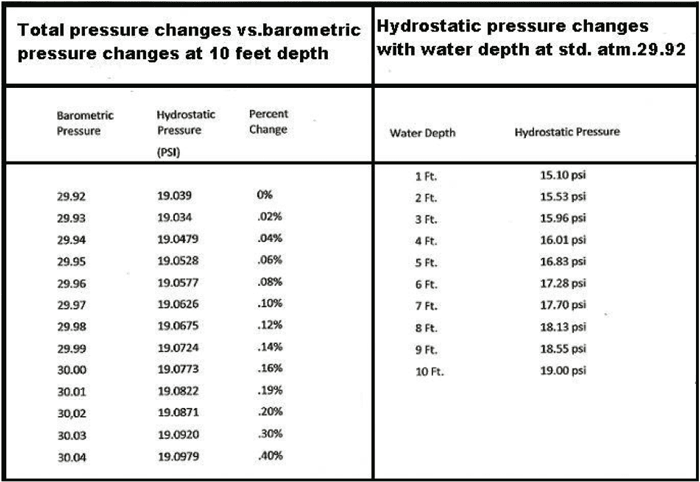If you want a good argument, try telling me that barometric pressure changes the behavior of freshwater fish. I’ll win the argument so don’t bet any money on it.
I have been fooled too many times by so called experts using barometric pressure as an excuse for not catching fish. As an engineer it always bothered me when I heard that excuse so I did a pretty thorough study of the subject and proved to myself that barometric pressure has absolutely no meaningful effect on the behavior of fish.
In my book, Beneath The Surface, I provide all of the mathematical work that conclusively proved my theory. The math was developed by a French mathematician named Blaise Pascal way back in 1647. Pascal provided us the relationships that defined how pressure is applied to an object under water. I simply adopted that theory and math to this argument. In its simplest form, the pressure applied to the body of a fish under water is the sum of the barometric pressure above the surface of the water and the hydrostatic pressure or water pressure which varies with water depth. Oh! There are a few other minor effects but for all practical purposes they cancel each other out. To visualize my theory, I created the two charts shown above.
I’ll use these two charts to make my point. The chart on the left shows the barometric pressure on the body of a fish at a depth of 10 feet. I varied the pressure from the low extreme of 29.92 to the other end of the useable range of 30.04. The total change in pressure applied to the fish only varies by four tenths of one percent over the entire range. The chart on the right shows the effect of changes in hydrostatic pressure at depths from one foot down to 10 feet. That pressure change is significant moving from 15.10 psi at one foot to 19.00 psi at 10 feet, an increase of more than 25%. The real pressure effect on fish is caused by the hydrostatic pressure of the water itself. Fish compensate for the hydrostatic pressure changes through their float bladder that is provided to them by nature to control their buoyancy in the water.
Why, you might ask, have so many people been fooled over the years into thinking that it was barometric pressure that was the culprit. You might remember that many years ago some very smart people actually believed that the world was flat. Eventually they got interested enough to find that it wasn’t. This is another one of those myths that have been handed down over the years. We simply accepted it so that when we went out fishing with a paid guide, he had a good excuse if no fish were caught.
It’s not quite that simple. There actually is a change in fish behavior during low pressure days and high pressure days, but it has nothing to do directly with barometric pressure. The real causal relationship is the sun. On high pressure days the sun is normally bright in the sky. Fish don’t like bright sun and they go deeper in the water and hide in structure to protect themselves from the glaring sun. On low pressure days, clouds usually prevail and there is no sun and fish become more active at all depths. Fishing is therefore usually better on low pressure days.
I feel that it is more the changing conditions, either high pressure or low pressure that makes fish behave different. We know that bass as an example are very resilient. They adapt easily to change, but it takes them some time to adapt. They may not like sunshine, but if the sun shines day after day, they will eventually adapt to that condition. My theory and practice is that on the third day of any condition, no matter what that condition is, the fishing gets back to normal. If it rains for three days, the third day provides the best fishing. If the sun shines for three days, the third day will produce the best fishing.
If you don’t agree with me on this theory, you can be proven wrong by buying one of my books where I deal with the subject scientifically. You can review my books at www.jakestakeonfishing.com. Try one of the books, you may like it.
[easy-social-share]
